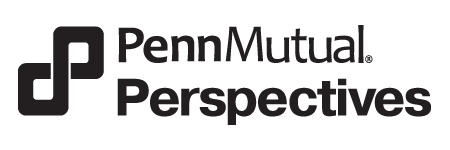The Secret to My Success: Always Look Five to 10 Years Ahead
I began working with Penn Mutual as a financial professional in December of 1952, eventually coming to run the largest agency in the company. I later left to become EVP of marketing and sales for two other companies, and Penn Mutual invited me back as a consultant in 2000. Since then, I’ve been working to keep Penn Mutual at the forefront of the insurance industry. You might think it’s strange that someone who has been in the industry for more than 60 years is so focused on the need to change, but, frankly, the insurance industry has always been about change.
I always felt that I had to be at least five years ahead of the curve and, if I could be, I worked to be 10 years ahead. Success has always taken work.
Around 50 years ago, I had become good friends with Al Granham, a top financial professional for another mutual company. We were running the top agencies for our respective companies, but we felt our agencies could each do better. This is not being critical, but the majority of the other agencies seemed satisfied to grow their businesses by 10 percent a year, while we were looking to double ours.
Al and I decided to create a cross-industry study group that, twice a year, would bring together eight or 10 of the top financial professionals in the country to explore the different issues facing our business. We reviewed what their sales practices were, how they dealt with compliance, and in short, what was working for them, and what wasn’t? The idea was that any of us might face similar challenges in the future.
We worked to bring in people from other industries to find out how they serviced their customers or made their operations more efficient, all in an effort to leverage successful practices into the life insurance industry. Frankly, I have found that from a distribution standpoint, most of the top agencies in the life insurance industry are far ahead of other industries in terms of building clientele, servicing clientele, and growing profitability. Things have obviously changed over the years, but the study group is still very active. As participants retired, they were replaced with younger financial professionals, many of them now in their 40s and 50s, forming a continuum for the future.
Looking back, it’s clear that the agencies and companies that did not strive to stay ahead by 5 or 10 years, that just settled on incremental growth, have all disappeared from the scene. The 80/20 rule tells you that 80 percent of the business will come from the top 20 percent of the organization. That hasn’t changed any in 60 plus years that I’ve been in the business, and I can’t imagine that it ever will.
One of the issues the study group has been grappling with recently is the question over whether the industry needs make better use of electronic media in engaging with our clients. Millennials have grown up using technology, emphasizing electronic media over face-to-face communication. Does that mean that we need to shift our business to match?
Before we get too far into this discussion, I should tell you that I’ve always been a strong proponent of technology. Penn Mutual was one of the first life insurance companies to embrace the computer age back in the 1960s. Our agency had over 60,000 policyholders. Keeping track of everything was a nightmare, so automation was a godsend. Even today, I was one of the first people to get an Apple iPhone, and, while I admit I’m a bumbler compared to my younger colleagues when using social media, I do use it.
Social media and similar technologies present a challenge for our industry, but it’s something I think we should be exploring. Remember, I want to be five or 10 years ahead of the curve.
In our particular business, we’re talking to people about something that is very private for them. Sometimes they haven’t even discussed it with their spouse, let alone anyone else. My personal experience is that, if you’re not there “eyeball to eyeball” with them, it’s sometimes very difficult for people to open up. We’ll have to wait and see in the future as to how these young folks will choose to communicate with their financial professionals and to make purchases.
One thing I have noted is that people are more wary of exchanging their personal information online because of the hacking that goes on. This came up in an interview in an agency recently. The financial professional had been working with a client where all the interaction had taken place electronically, and it came time to gather the information needed to work on the financial plan. The client balked: “I know you need the information, but I will not put my personal information online.” Clearly, as we are developing ourselves as trusted financial professionals to our clients, we also must ensure that our technology can also be trusted.
I think testing our assumptions about how people will want to use these technologies is key to our ultimate success. The largest agency in my study group has recently scrapped their test efforts to work with clients strictly electronically. The agency was spending a lot of time and money on the effort, but it was not producing that much in additional sales. Now, when I say they scrapped the whole thing, they kept making appointments electronically and communicating in general areas with the clients, but when it came down to getting the information that they need for proper planning, they decided it was not worth it.
Will that change in the future? I don’t know, but I don’t know of an agency that’s tried harder than that agency has. We should never forget that, in business, it comes right down to the results. We must never forget our core focus on solving the client’s problem and putting in place the life insurance, investments, disability income, long-term care, and so forth, needed to help accomplish the client’s financial goals.
For the last 60 years, I have felt that the insurance industry is one of the greatest businesses in the world to work in. It’s a career with purpose, and people genuinely need our services. My wife has to hold me back sometimes when I hear someone giving terrible advice on one of the financial news networks. People need good advice more today than ever before because, considering we live in the information age, a lot of the “information” people have been getting about their financial lives just isn’t right. We have a chance to make a difference in people’s lives, all while owning and growing our own businesses.
This post is for informational purposes only and should not be considered as specific financial, legal or tax advice. Depending on your individual circumstances, the strategies discussed in this presentation may not be appropriate for your client’s situation. All opinions expressed in this post are solely those of the author and do not necessarily reflect the opinions of Penn Mutual, its affiliates or employees. The information in this material is not intended as tax or legal advice. Always consult your legal or tax professionals for specific information regarding your individual situation.
3115614CC_JUN22






